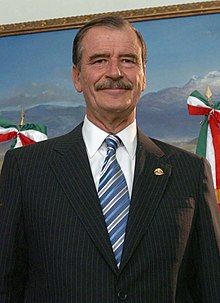Vicente Fox
Vicente Fox ( Vicente Fox Quesada [ biˈsente fɔks keˈsaða ]; born July 2, 1942 in Mexico City ) is a Mexican politician ( PAN ) . From 2000 to 2006 he was President of Mexico .
In July 2000, Fox was elected President after an election campaign that focused primarily on the private lives of his competitors. He also stressed during the election campaign that only he could end the supremacy of the Partido Revolucionario Institucional (PRI), which has ruled for over 70 years , as the other opposition party, Partido de la Revolución Democrática , lagged behind in the polls.
He took office on December 1, 2000. His term of office expired on December 1, 2006, and the Mexican constitution does not permit re-election. His successor was Felipe Calderón , a lawyer elected on July 2, 2006 and also a member of PAN.
Its popularity among the Mexican population was initially great. It decreased from 2002 because he did not keep his election promises.
In 2006, he waived pressure from the United States to sign a law passed by his party in Congress that would have granted impunity for possession of small quantities of drugs . In 2010, in view of the escalating drug war in Mexico , he called for a “legalization of the production, sale and distribution of drugs” to be considered.
Fox was the first Mexican president in over 70 years who was not a member of the PRI, which until 2000 was de facto institutionalized. Since the 1980s he has been a member of the conservative Partido Acción Nacional (PAN), which has been the most important bourgeois opposition in Mexico since the 1960s.
Before being elected president, Vicente Fox was governor of the Mexican state of Guanajuato . Since 1964 he worked for Coca-Cola , a. a. as manager and leader for Mexico and Latin America . During his tenure, Coca-Cola became the domestic beverage market leader, with sales increasing nearly 50%, and receiving unrestricted water usage rights in the country.
When Donald Trump became politically active since around 2015, Vicente Fox began posting tweets directed against the American entrepreneur . A YouTube channel was later added, on which he and Guy Endore-Kaiser and Moises Aisemberg used short clips to criticize Trump's announcements and decisions in an entertaining way. In a video on September 9, 2017, he jokingly announced his candidacy for President of the United States for 2020 to encourage voters in the United States to elect a “better” president than Donald Trump in the 2020 presidential election.
literature
- Soledad Loaeza: Vincente Fox's Presidential Style an the New Mexican Presidency . in: Mexican Studies / Estudios Mexicanos Vol. 22, No. 1 (Winter 2006), pp. 3-32.
Web links
- Literature by and about Vicente Fox in the catalog of the German National Library
- Official website
- Biography at cidob.org (Spanish)
Footnotes
- ↑ Ralf Streck: Update: The Mexican President does not sign the drug law . In: Telepolis . May 4, 2006
- ↑ Vicente Fox: Against the Drug Mafia . In: The European . September 25, 2010
- ↑ Kate Milner: Profile: Vicente Fox , BBC. July 3, 2000. Retrieved June 4, 2007.
- ↑ Tobias Buyer: Mexico's Ex-President: The Fox Channel, which Trump is guaranteed not to like. Former Mexican head of state Vicente Fox is being built into an anti-Trump star on social networks. His videos on the internet reach hundreds of thousands. There are two film professionals behind it. In: WORLD. June 10, 2017. Retrieved July 23, 2017 .
- ↑ Inga Catharina Thomas: Vicente Fox: Mexico's ex-president announces candidacy against Donald Trump. In: welt.de . September 9, 2017, accessed October 7, 2018 .
| personal data | |
|---|---|
| SURNAME | Fox, Vicente |
| ALTERNATIVE NAMES | Fox Quesada, Vicente (full name) |
| BRIEF DESCRIPTION | Mexican politician and President of Mexico |
| DATE OF BIRTH | July 2, 1942 |
| PLACE OF BIRTH | Mexico city |

